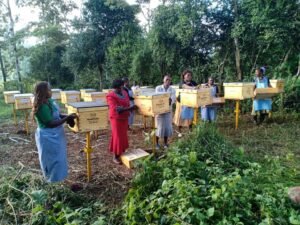By Murimi Gitari, March 10, 2025 — On International Women’s Day 2025, a coalition of leading organizations spotlighted the critical need for investment in women’s leadership and resources to transform Africa’s agri-food systems. The CGIAR Gender Equality and Inclusion (GEI) Accelerator, African Women in Agricultural Research and Development (AWARD), International Livestock Research Institute (ILRI), and CIFOR-ICRAF united to advance women’s empowerment in agriculture under the theme “For ALL Women and Girls: Rights. Equality. Empowerment.”
Women play essential roles in agri-food systems, from production and processing to distribution and trade. Their contributions ensure food and nutritional security across communities. Despite this, they face systemic barriers, including limited access to land, financial services, and agricultural resources, as well as restricted market participation and decision-making opportunities.
In sub-Saharan Africa, for instance, women contribute to over two-thirds of food production but own less than 15% of agricultural land. These inequities not only hinder women’s potential but also threaten food security, economic growth, and resilience—challenges worsened by climate change.
Professor Appolinaire Djikeng, Director General of ILRI, speaking during an event hosted by ILRI to celebrate women in research and science at the Nairobi campus, emphasized the importance of addressing gender inequalities holistically.
“Let us not just look at the global statistics on women empowerment. We must internalize the data, contextualize, and see where the gaps are and how to fix them. Women empowerment is for all of us,” he stated. While noting that 40% of ILRI’s workforce comprises women, he stressed the need for greater representation at leadership levels. He also highlighted the importance of early-career support for women aspiring to leadership and research roles.
Dr. Susan Kaaria, Director of AWARD, shared findings from the forthcoming report, Status of Women in African Agrifood Systems in Sub-Saharan Africa, which reveals significant gender gaps in land ownership, access to resources, and decision-making power. She noted that agriculture often serves as a more critical source of livelihood for women than for men, especially in low- and middle-income countries.
“For instance, in sub-Saharan Africa, 66% of women’s employment is in agri-food systems, compared to 60% of men’s,” she explained. Dr. Kaaria also underscored the need for investment in data to better manage gender disparities.
Climate change continues to exacerbate existing challenges, with experts warning of dire consequences if disparities are not addressed. Dr. Thomas Dubois, Director of Impact Delivery at ICIPE, cautioned that under a worst-case scenario, up to 158 million more women and girls could fall into extreme poverty by 2050, with nearly half of them in sub-Saharan Africa. He highlighted the potential of innovative sectors like beekeeping and black soldier fly farming to boost soil health, animal nutrition, and economic opportunities, calling for more women to engage in these areas.
The event also showcased strategies empowering women in agriculture, such as mentorship programs, leadership development, and improved access to land and capital. Dr. Éliane Ubalijoro, CEO of CIFOR-ICRAF, highlighted the critical role of women in food security and science. “The work that we do collectively feeds humanity,” she affirmed.
As climate threats intensify, a collective commitment from policymakers, researchers, and the private sector is essential to fostering inclusive and sustainable agrifood systems. The gathering concluded with a strong call to action, urging stakeholders to champion gender equity and fully recognize women’s contributions to Africa’s agricultural transformation.







